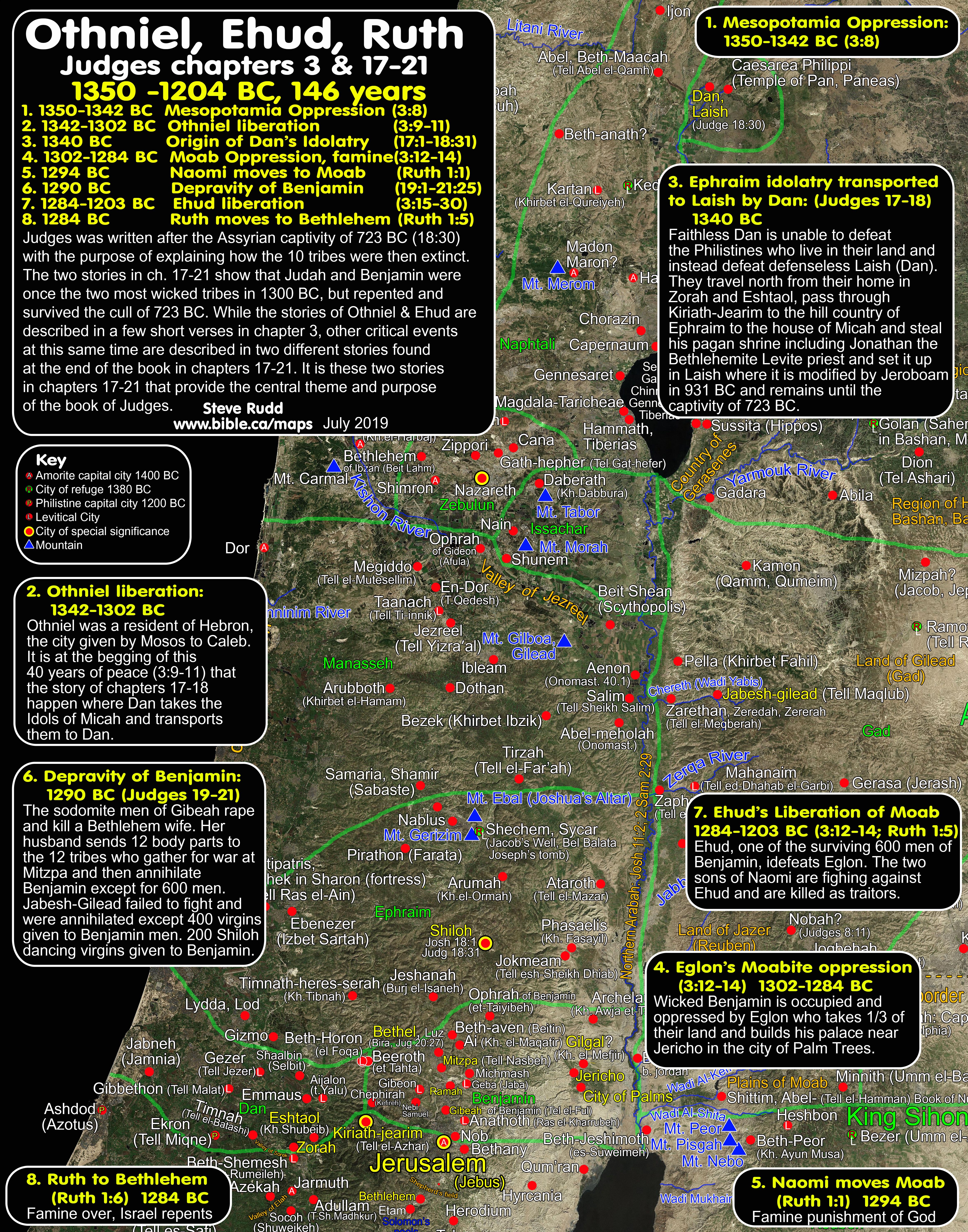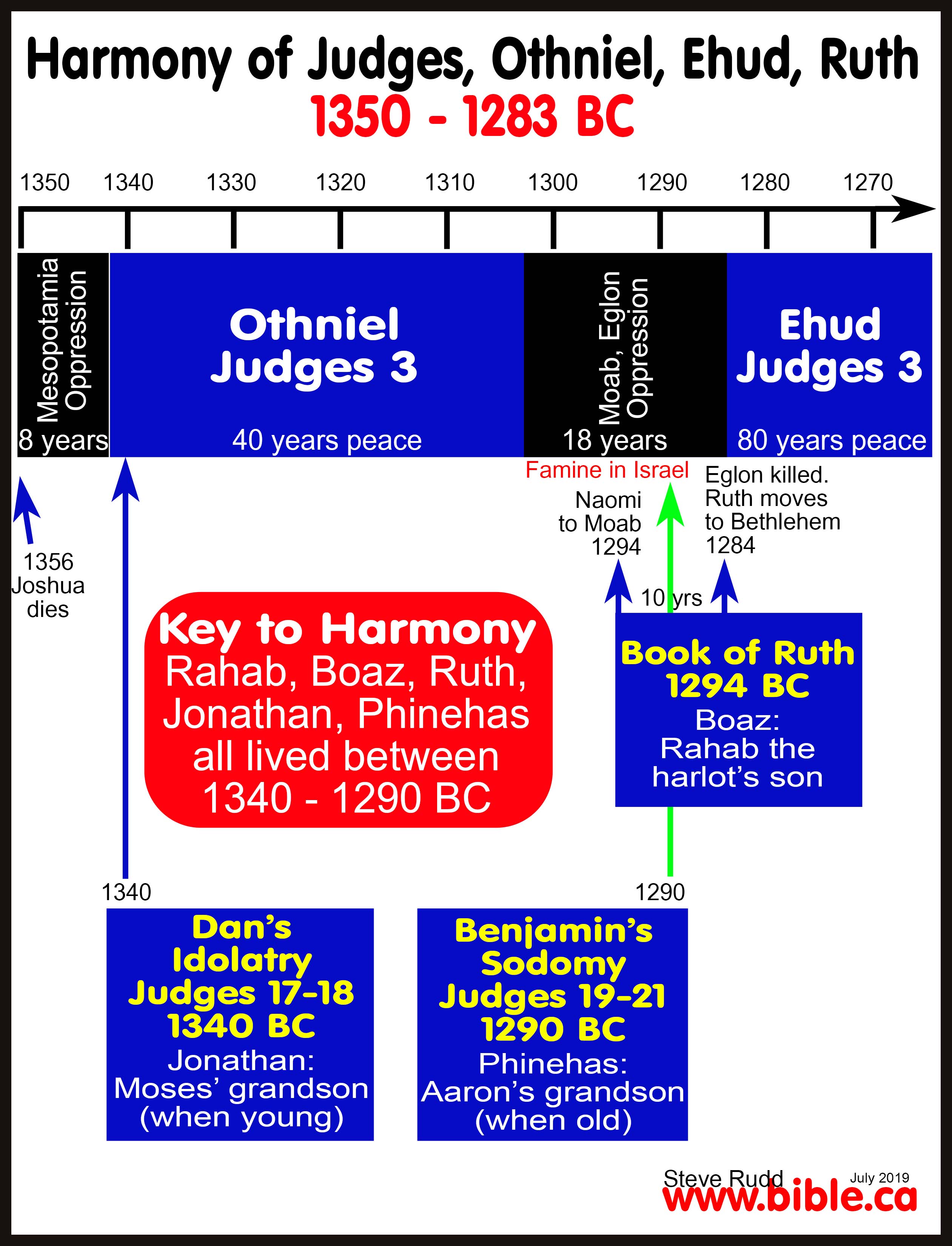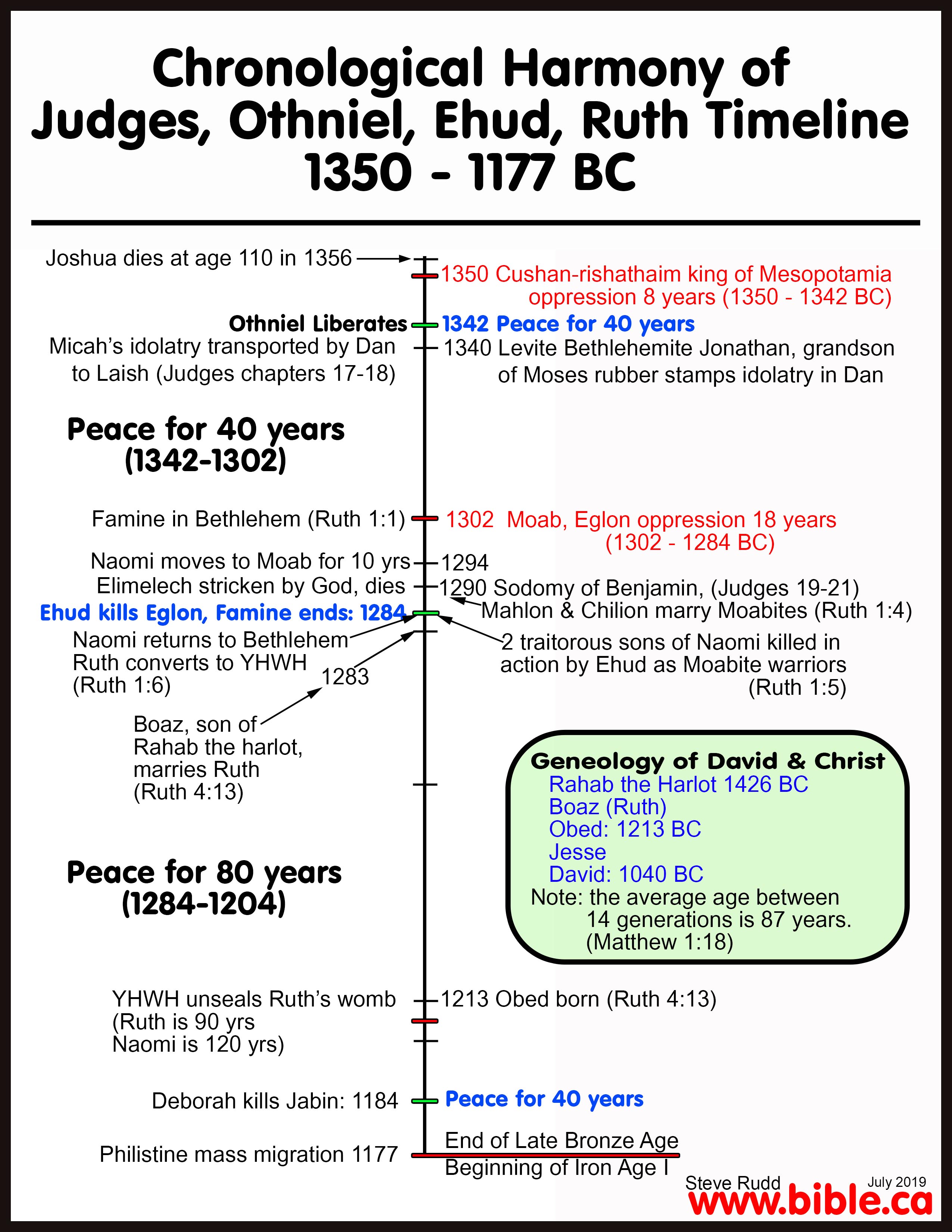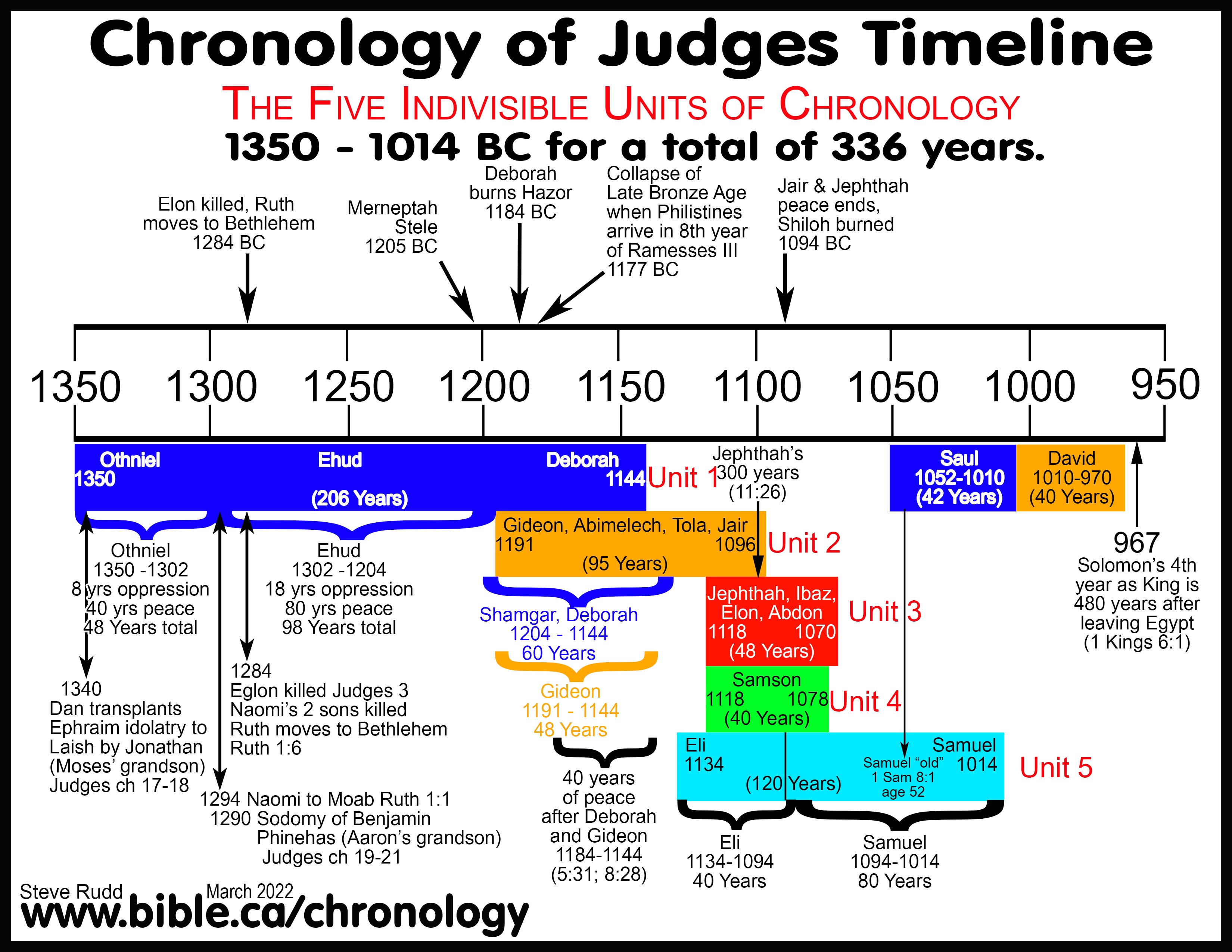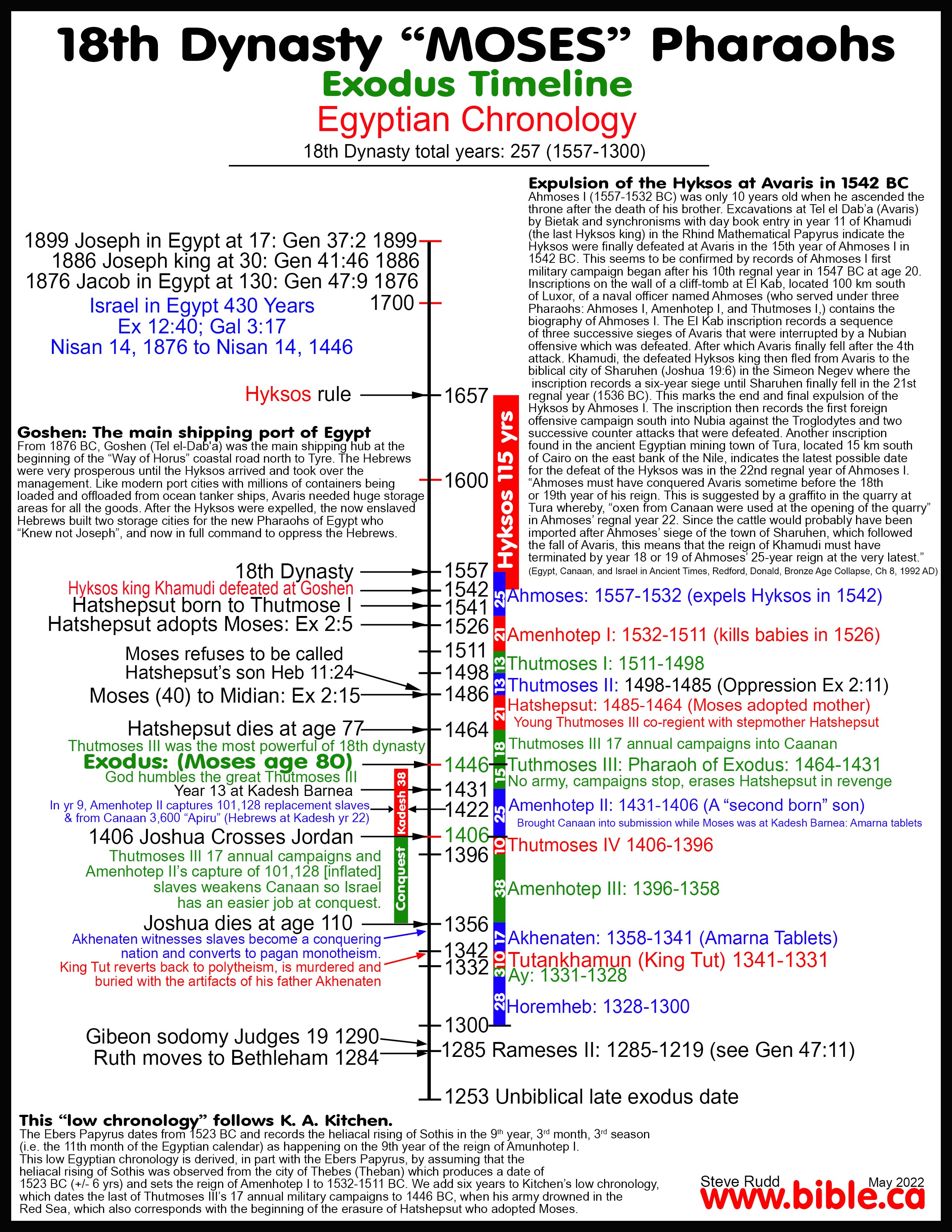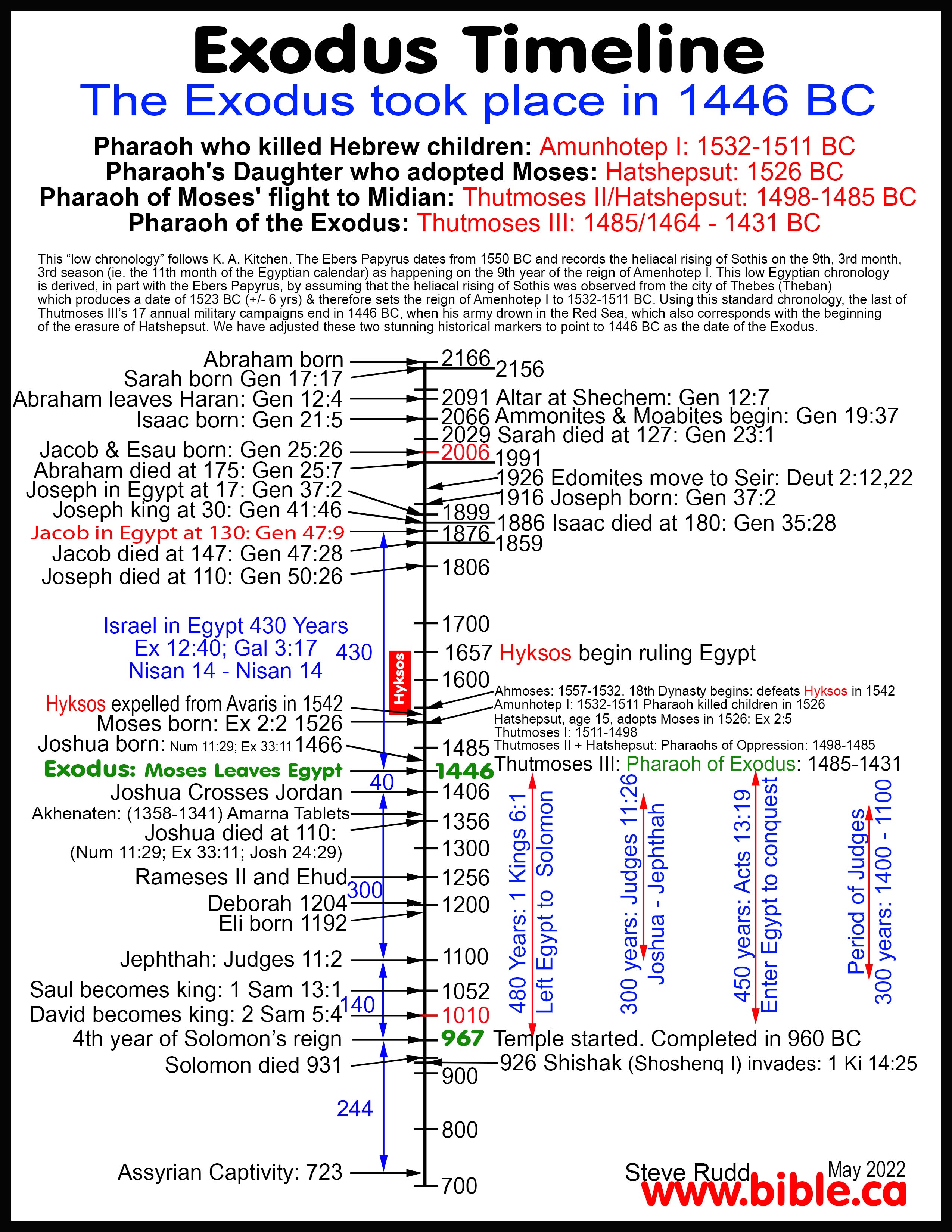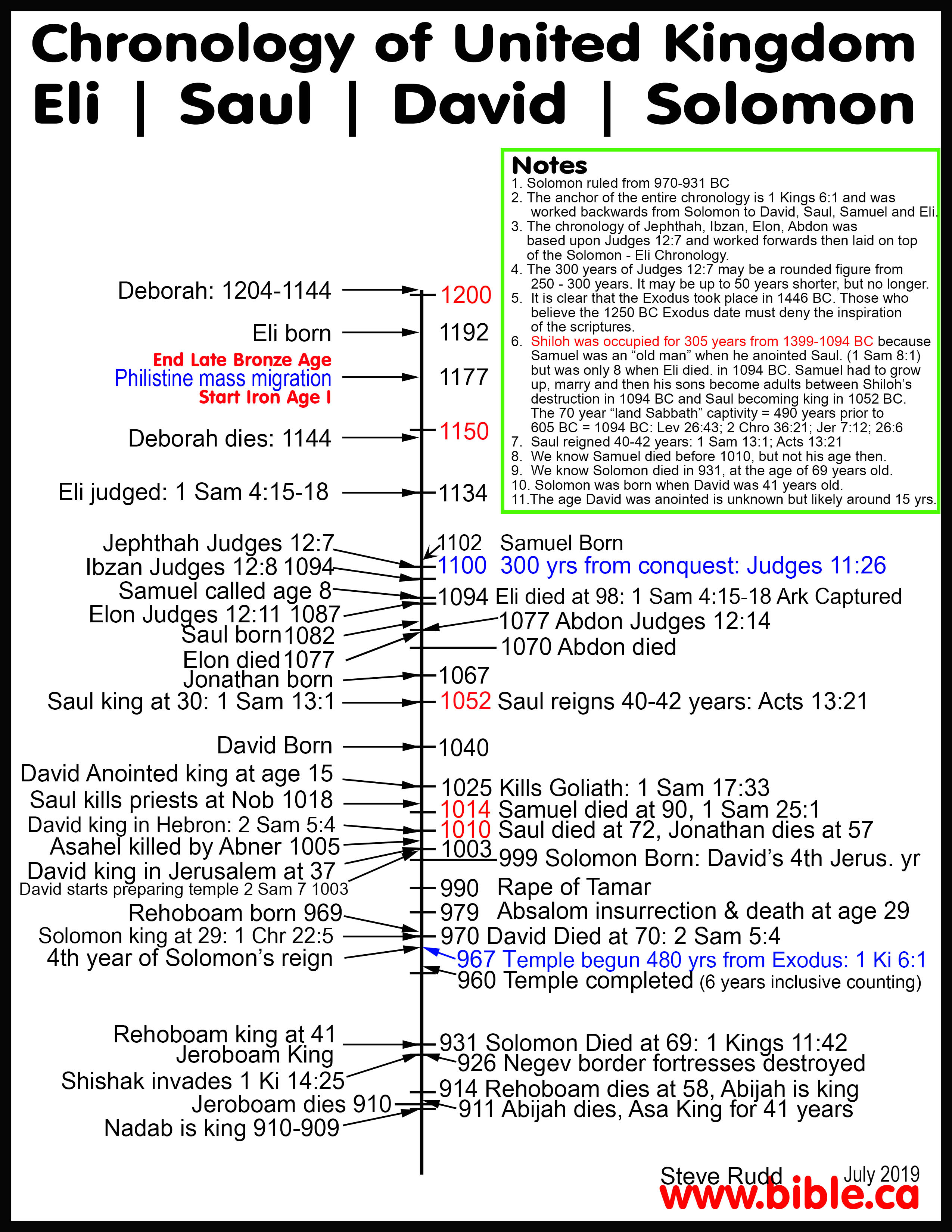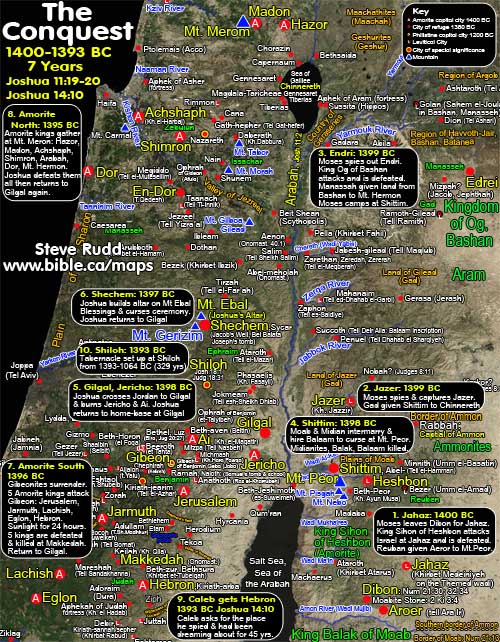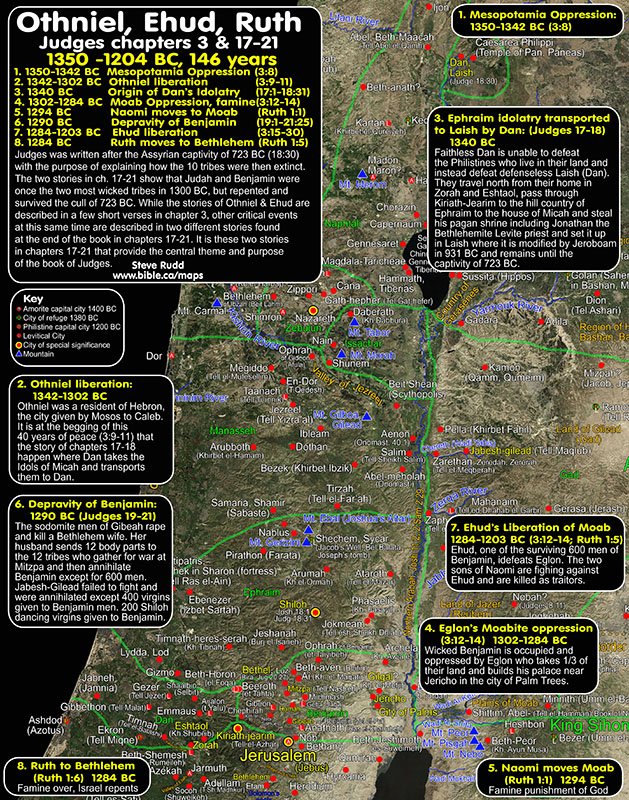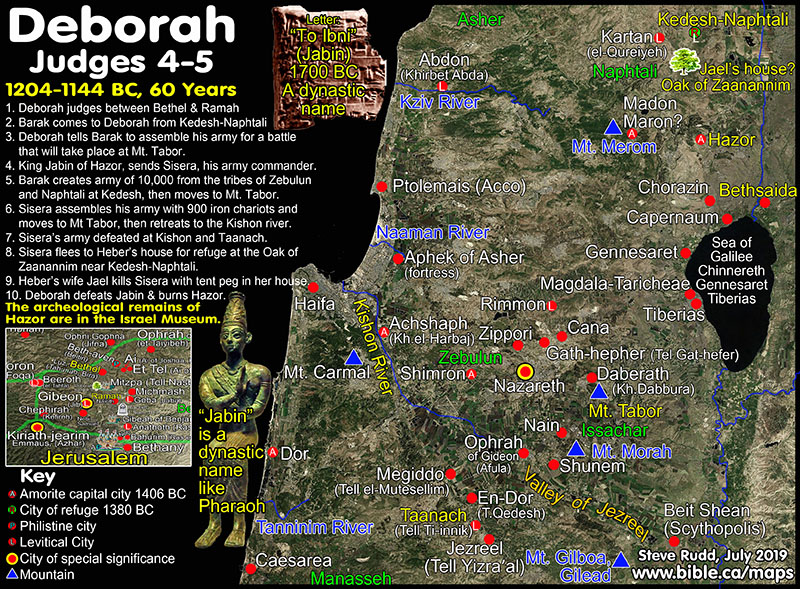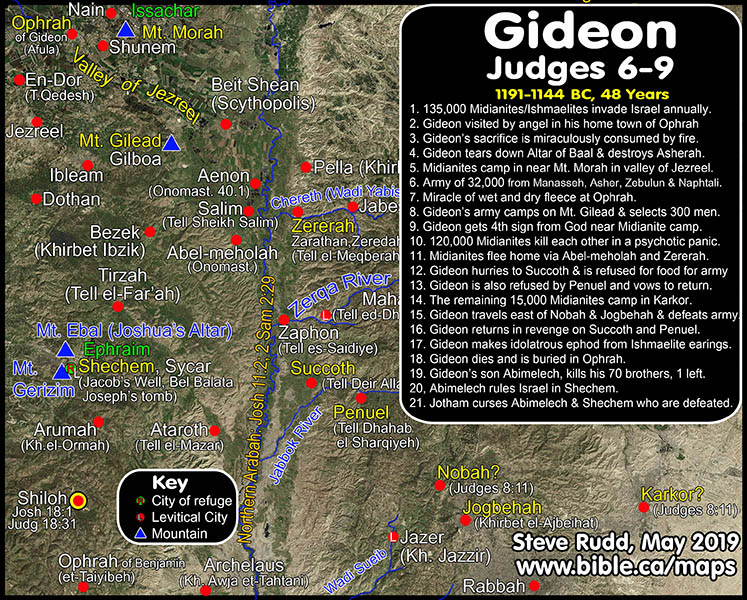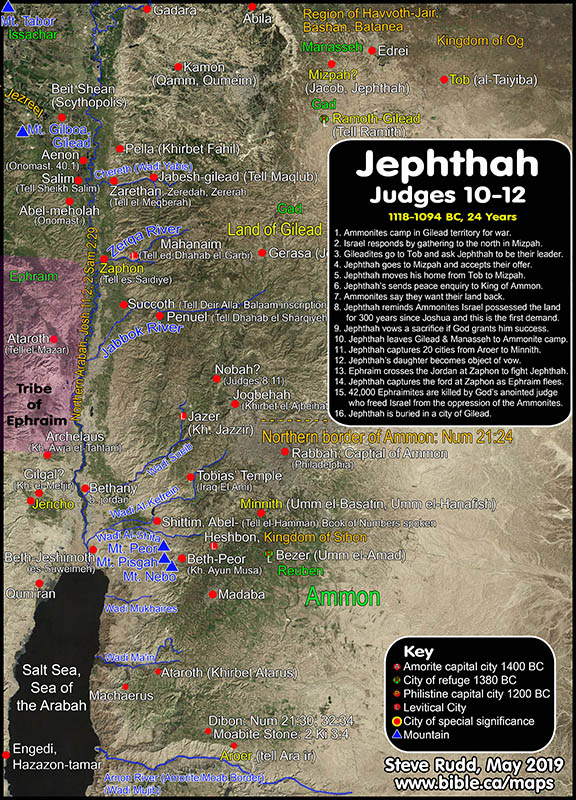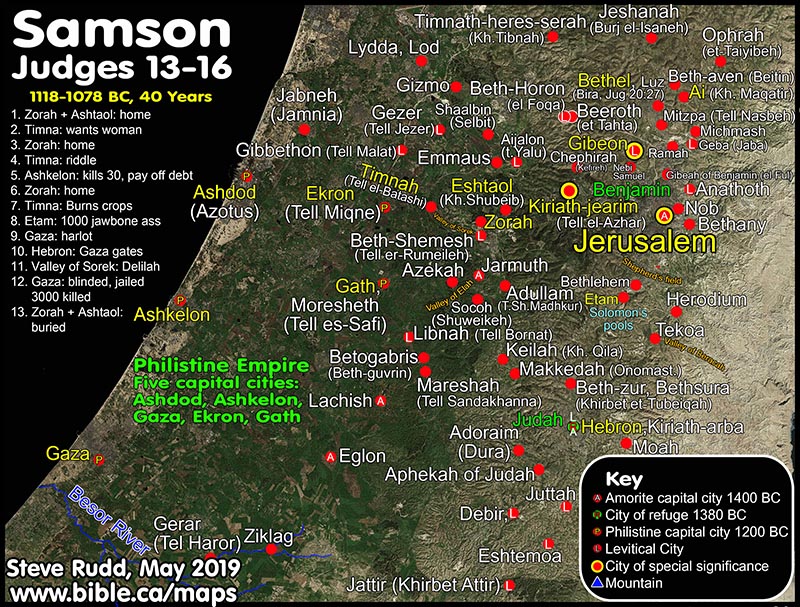The Book of Ruth
1300 BC
Timeline, maps, chronology, sermons of Ruth
|
|
|
|
|
|
|
|
|
Old Testament Chronology and Timelines |
||||||
|
Chronology of the Flood outline |
Chronology of Egypt outline |
Chronology of the Exodus outline |
Chronology of Judges outline |
Chronology of Ruth outline |
Chronology Eli-Solomon outline |
Chronology of Kings outline |
|
Coming |
||||||
|
|
|
|
|
|
|
|
|
Judges Sermon Outlines |
||||||
|
Conquest |
Othniel, Ehud, Ruth |
Deborah |
Gideon |
Jephthah |
Samson |
Eli, Samuel, Saul, David |
|
1406-1399 |
1350-1204 |
1204-1144 |
1191-1144 |
1118-1094 |
1118-1078 |
1104-1004 |
|
Josh 1-15 |
Judges 3, 17-21, Ruth |
Judges 4-5 |
Judges 6-9 |
Judges 10-12 |
Judges 13-16 |
1 Samuel 1-31 |
|
Canaanites |
Mesopotamia, Edom |
Hazorites |
Ishmaelites, Midianites |
Ammonites |
Philistines |
Philistines, Ammonites, Amalekites |
|
|
|
|
|
|
|
|
The Book of Ruth
(Harmony of Judges, Othniel, Ehud, Ruth)
Other related outlines:
1. Harmony of Othniel, Ehud, Judges 17-18, Judges 19-21 and Ruth
2. Book of Ruth: Ruth and Boaz lived in the time of Ehud: 1300 BC
3. Chronology of the book of Judges solved
Introduction:
1. The book of Ruth is the story of a sinful lost family who is falling away from the one true God who shows mercy and grace and brings them back from oblivion and condemnation to the honour of being a direct ancestor of Christ.
2. Naomi and her husband Elimelech and their two sons each owned considerable farmland in Bethlehem area. A famine caused by a drought, forces them to leave Israel and move to pagan Moab.
A. Dating and Authorship:
1. The date and author of the book is unknown and anything beyond this is speculation.
a. However, we speculation it was Solomon who wrote Ecclesiastes and Song of Solomon.
b. Just as Solomon had to "eat crow" in writing the book of Song of Solomon wherein he gets dumped by the hottie Shunamite for a shepherd boy, so too the story of pure monogamous love between Ruth and Boaz his grandfather, stands in sharp contrast to his polytheism.
2. The book was clearly written as a way of establishing the history of David and therefore was likely written sometime during the reign of David or Solomon. (1021-924 BC)
a. It makes sense that Solomon wrote it in order to validate his throne and ancestor through his father.
b. Therefore the date that the book of Ruth was written would be between 964 - 924 BC
B. We have five methods to determine when Ruth lived:
1. If we use averages in numbers of 14 generations we arrive at 1295 BC for the general time of Ruth. Calculations as follows:
a. "Thus there were fourteen generations in all from Abraham to David, fourteen from David to the exile to Babylon, and fourteen from the exile to the Christ." (Mt 1:18)
b. Abraham to David are 13 actual generations, Hebrew inclusive counting started with Abraham as 1, rather than 0:
i. Birth of Abraham: 2160 BC - Birth of David: 1034 = 1126 years for 13 generations
ii. 87 average years per generation
iii. times 3 generations back to Ruth: 87 years x 3 generations = 261 years before David is born.
iv. David born in 1034 BC + 261 years for three generations = 1295 BC
c. So using the average number of years between generations, amazingly brings us to the time of Ehud in 1295 BC.
d. It may surprise the reader to learn that the average age when children were born to parents was 87 years. However, this may be more an insight into male fertility at an old age, than of women. These older men apparently had younger wives who bore them children.
2. We know that Ruth is the great-grandmother of David.
a. Three generations from Ruth/Boaz to David:
i. "and to Salmon was born Boaz, and to Boaz, Obed,
ii. and to Obed was born Jesse,
iii. and to Jesse, David." (Ruth 4:21-22)
b. Ruth was David's great grandmother
c. Ruth + Boaz get married 1283 BC
d. Obed, son of Ruth in 1207 BC
e. Jesse, son of Obed, father of David
f. David, son of Jesse, Great grandson of Ruth
3. Ruth was young when she married and Naomi was old when Obed was born: Ruth 4:13-15: "So Boaz took Ruth, and she became his wife, and he went in to her. And the Lord enabled her to conceive, and she gave birth to a son. Then the women said to Naomi, "Blessed is the Lord who has not left you without a redeemer today, and may his name become famous in Israel. "May he also be to you a restorer of life and a sustainer of your old age; for your daughter-in-law, who loves you and is better to you than seven sons, has given birth to him." (Ruth 4:13-15)
a. Naomi stated she was too old to have a husband at the time she left Moab for Bethlehem. Therefore, Naomi was likely 45-60 years old at this time. Given Ruth was young, likely 15-25.
b. Ruth is described as a young woman twice by Boaz when he asks "whose young woman is this?" and then later he praised her that she did not go after young men.
c. Ruth is a young woman when she married her Moabite husband and was without any children when she returned to Bethlehem with Naomi.
d. In 1283 BC Ruth would be 20-25 years old she marries Boaz.
e. We have no idea when Obed was born, but it would be sometime in Naomi's old age before she died
f. If Naomi lived to be 120, which was certainly not unusual for the time, then Obed would have born 1207 BC when Ruth was 90. Remember the average for 13 generations is 87 years.
g. We have an indication that Ruth gave birth in her old age is the phrase in 4:13 "And the LORD enabled her to conceive".
i. This indicates that her womb had been closed.
ii. This may explain why she had no children from her first husband.
iii. All the great women of history (Sarah, Rachael, Hanna) had historically important children in their old age because God had closed their wombs.
iv. Therefore, the phrase that God enabled her to conceive is a clear indication she had the child in her old age.
h. So Ruth was young when she got married and old when she had Obed.
i. This places Obed's birth about 1207 BC.
4. But the clincher that nails Ruth's marriage to Boaz around 1283 BC is the fact that Rahab the Harlot was Boaz's mother!
a. "Salmon was the father of Boaz by Rahab, Boaz was the father of Obed by Ruth, and Obed the father of Jesse. Jesse was the father of David the king. David was the father of Solomon by Bathsheba who had been the wife of Uriah." (Matthew 1:5-6)
b. Rahab the Harlot was a young prostitute in 1406 BC when Joshua sent spies to Jericho in Joshua 2.
c. This is means that our date of 1280 BC for Ruth and Naomi moving back to Bethlehem from Moab is reasonable.
5. The migrations of Naomi to Moab and back must coincide with a period of oppression followed by a period of liberation by a judge.
a. After Ehud liberated Israel from Moab by killing Eglon, there was 80 years of peace followed by 20 years of oppression by Jabin, king of Hazor, until Deborah.
b. Deborah liberated Israel from Jabin in 1184 BC.
c. This is just too late for Rabab to be Ruth's mother in law.
d. Therefore, the only liberation that fits the book of Ruth is Ehud in 1283 BC.
C. Summary of dates and events:
1. What we know for certain from these events and reasonable sure on the general dates:
a. The oppression of Eglon, king of Moab was 1302-1284 BC
b. We know Naomi left Bethlehem when Israel was under the curse of famine and Eglon was oppressing Israel.
c. We know that Naomi lived in Moab for ten years when her two sons died and it was then, the returned to Bethlehem.
d. We know Naomi returned to Bethlehem when the famine was over, because Israel had repented and Eglon was killed by Ehud. Naomi's two sons killed in the Ehud liberation against Moab in 1283 BC. (Judges 3) The ten years Naomi was in Moab ended when Eglon and her two sons were killed.
e. We know there was an 80-year period of peace after Moabite oppression ended.
2. Summary of dates:
a. 1350 Joshua dies
b. 1350-1342 BC oppression by Cushan-rishathaim king of Mesopotamia
c. 1342 Othniel defeats Mesopotamia and liberates Israel for 40 years.
d. 1342-1302 BC Peace in Israel for forty years.
e. 1340 BC Micah's idolatry is transplanted from the hills of Ephraim to Laish (Judges chapters 17-18)
f. 1302 BC oppression by Eglon, King of Moab begins for 18 years with his palace occupying the eastern third of Benjamin's land at the city of Palms near Jericho.
g. 1302 Famine in Bethlehem because of moral decay and idolatry. (Ruth 1:1)
h. 1294 Elimelech, Naomi and her two sons move from Bethlehem to Moab to escape the famine, even though they own considerable farmland. (Ruth 1:1; 4:9)
i. 1290 BC, Judah goes to war against Benjamin for sodomite depravity. (Judges 18-21) The famine in the land was because Israel was under a curse for the moral decay seen in Gibeah by the Benjaminites and for Idolatry.
j. 1290 BC, Naomi's two sons, Mahlon & Chilion marry Moabites in violation of the law of Moses. (Ruth 1:4). The Moabite wives (Ruth and Orpah) influenced their Jewish husbands to worship their idol gods and adopt Moabite custom and allegiance. We know this because when Orpah left, Naomi said: "Behold, your sister-in-law has gone back to her people and her gods" (Ruth 1:15)
k. 1290 BC Elimelech dies, likely stricken by God for abandoning his inheritance, allowing his two sons to marry Moabites and not joining the battle against Benjamin in Judges 20. The entire town of Jabesh-Gilead were annihilated in Judges 21:8, for failing to join Israel in the war against Benjamin. Elimelech therefore probably suffered the same fate as the Jabesh-Gilead for the same reason, except it was God that killed him, not man.
l. 1283 BC Israel repents after the slaughter of Benjamin in Judges 18-21, the famine is ended and God then sends Ehud who kills Eglon King of Moab in his palace in the city of Palm trees near Jericho.
m. 1283 BC, the two Moabite wives, Ruth and Orpah influenced their Hebrew husbands to fight for Moab against Ehud and Israel and are "killed in action" as they fought for Eglon, King of Moab. Mahlon & Chilion have not only lost their faith in YHWH, they are no fighting against the one true God and are traitors.
n. 1283 BC Naomi decides to move back to Bethlehem since her husband and two sons are dead and the famine is over.
o. 1283 BC. It is at this point that Ruth has a major conversion to YHWH. She realizes that the gods of Moab are false gods and sees the virtue of faith never lost in Naomi.
p. 1279 BC Boaz, son of Rahab the harlot, marries Ruth (Ruth 4:13)
q. 1207 BC Obed, David's grandfather, was born to Ruth and Boaz. Ruth would be about 90, Naomi would be about 120 years old.
D. Why the famine of Ruth 1:1 in Bethlehem must be a period of apostasy:
1. There are a whole series of passages that directly link a lack of rain, failed crops and famine to Israel worshipping idols and moral decay. Notice that Elimelech, Naomi and their two sons had considerable farm land, but had to move to Moab where there was food.
a. "Now it came about in the days when the judges governed, that there was a famine in the land. And a certain man of Bethlehem in Judah went to sojourn in the land of Moab with his wife and his two sons. The name of the man was Elimelech, and the name of his wife, Naomi; and the names of his two sons were Mahlon and Chilion, Ephrathites of Bethlehem in Judah. Now they entered the land of Moab and remained there. Then Elimelech, Naomi's husband, died; and she was left with her two sons. They took for themselves Moabite women as wives; the name of the one was Orpah and the name of the other Ruth. And they lived there about ten years. Then both Mahlon and Chilion also died, and the woman was bereft of her two children and her husband. Then she arose with her daughters-in-law that she might return from the land of Moab, for she had heard in the land of Moab that the LORD had visited His people in giving them food." (Ruth 1:1-6)
b. "YHWH visited His people indicates Israel had repented!
c. Therefore, the ten years spent in Moab in book of Ruth must overlap a period of oppression and repentance during the period of the Judges. Only Ehud fits this and is the only possibility, considering that Rabab the harlot was the mother of Boaz.
2. Here are some of the passages that link Israel's apostasy and sin with famine and curse:
a. "'If you walk in My statutes and keep My commandments so as to carry them out, then I shall give you rains in their season, so that the land will yield its produce and the trees of the field will bear their fruit. 'Indeed, your threshing will last for you until grape gathering, and grape gathering will last until sowing time. You will thus eat your food to the full and live securely in your land. 'I shall also grant peace in the land, so that you may lie down with no one making you tremble. I shall also eliminate harmful beasts from the land, and no sword will pass through your land. 'But you will chase your enemies and they will fall before you by the sword; five of you will chase a hundred, and a hundred of you will chase ten thousand, and your enemies will fall before you by the sword." (Leviticus 26:3-8)
b. "'But if you do not obey Me and do not carry out all these commandments, if, instead, you reject My statutes, and if your soul abhors My ordinances so as not to carry out all My commandments, and so break My covenant, I, in turn, will do this to you: I will appoint over you a sudden terror, consumption and fever that will waste away the eyes and cause the soul to pine away; also, you will sow your seed uselessly, for your enemies will eat it up." (Leviticus 26:14-16)
c. "It shall come about, if you listen obediently to my commandments which I am commanding you today, to love the LORD your God and to serve Him with all your heart and all your soul, that He will give the rain for your land in its season, the early and late rain, that you may gather in your grain and your new wine and your oil. "He will give grass in your fields for your cattle, and you will eat and be satisfied. "Beware that your hearts are not deceived, and that you do not turn away and serve other gods and worship them. "Or the anger of the LORD will be kindled against you, and He will shut up the heavens so that there will be no rain and the ground will not yield its fruit; and you will perish quickly from the good land which the LORD is giving you." (Deuteronomy 11:13-17)
d. "Blessed shall be the offspring of your body and the produce of your ground and the offspring of your beasts, the increase of your herd and the young of your flock. "Blessed shall be your basket and your kneading bowl." (Deuteronomy 28:4-5)
e. "The LORD will open for you His good storehouse, the heavens, to give rain to your land in its season and to bless all the work of your hand; and you shall lend to many nations, but you shall not borrow." (Deuteronomy 28:12)
f. "Cursed shall be your basket and your kneading bowl. "Cursed shall be the offspring of your body and the produce of your ground, the increase of your herd and the young of your flock." (Deuteronomy 28:17-18)
g. "The LORD will make the rain of your land powder and dust; from heaven it shall come down on you until you are destroyed. "The LORD shall cause you to be defeated before your enemies; you will go out one way against them, but you will flee seven ways before them, and you will be an example of terror to all the kingdoms of the earth. "Your carcasses will be food to all birds of the sky and to the beasts of the earth, and there will be no one to frighten them away." (Deuteronomy 28:24-26)
Conclusion:
1. In the period between 1340 - 1284 BC we have three different stories that focus on Bethlehem:
a. 1340 BC: Levite Jonathan, grandson of Moses is a Bethlehemite who moves north to accept a job with Micah in the hill country of Ephraim as the priest of a pagan shrine in rebellion to YHWH
b. 1294 BC Elimelech, Naomi and their two sons move from their drought-stricken land in Bethlehem to Moab for ten years then return.
c. 1290 a harlot wife from her home town of Bethlehem is raped and killed by the sodomite men of Benjamin in Gibeah which leads to the near extinction of the tribe of Benjamin.
2. It is clear that these stories come as a shock and surprise to those who read the book of Ruth that was written by Solomon 964 - 924 BC and the book of Judges that was written in 720 BC after the Assyrian captivity.
3. Although Bethlehem is a small and insignificant town, it produced Boaz and Ruth, David and eventually, Jesus Christ.
4. The book of Ruth is not so much a beautiful love story between Ruth and Boaz, as much as it is a story of a prodigal family coming to repentance and God bringing them back from destruction to the center of spiritual importance.
Other related outlines:
1. Harmony of Othniel, Ehud, Judges 17-18, Judges 19-21 and Ruth
2. Book of Ruth: Ruth and Boaz lived in the time of Ehud: 1300 BC
3. Chronology of the book of Judges solved
By Steve Rudd: Contact the author for comments, input or corrections.
